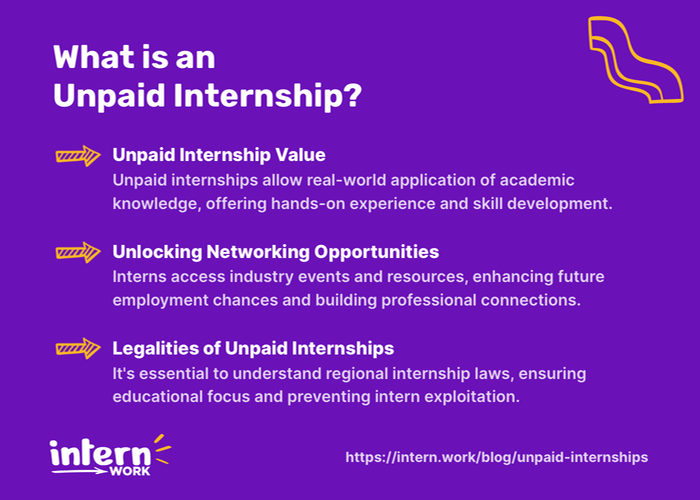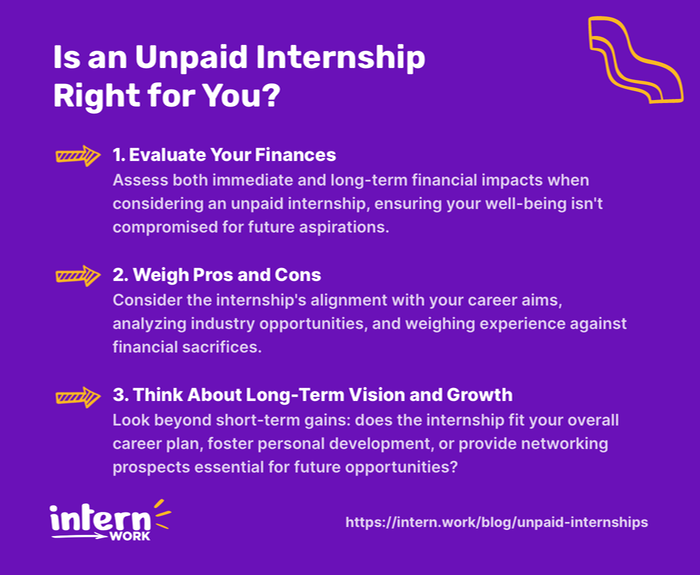
Unpaid internships have become a hot-button topic in recent years. While some argue that they provide valuable work experience and opportunities for career growth, others condemn them as exploitative and unfair. This article explains the world of unpaid internships, examining their definition, legal aspects, prevalence, benefits, drawbacks, decision-making process, tips for navigating them, and their role in today’s job market.
What is an Unpaid Internship?
Let’s start by defining what exactly an unpaid internship is. An unpaid internship is a work experience program where individuals, often students or recent graduates, work for an organization without monetary compensation. Instead, the focus is on gaining hands-on experience, exposure to the industry, and developing valuable skills for future employment.
Defining Unpaid Internships
An unpaid internship typically involves working for a fixed duration, usually a few weeks or months, and often as a full-time commitment. It is structured to provide a real-world learning environment where participants can apply theoretical knowledge gained through their studies.
During an unpaid internship, interns are allowed to immerse themselves in the organization’s day-to-day operations. This can include shadowing experienced professionals, attending meetings, and actively contributing to projects. By actively participating in various tasks and projects, interns gain valuable insights into the industry’s inner workings and develop practical skills that can be applied in their future careers.
Moreover, unpaid internships often provide access to industry-specific resources and networks. Interns may have the chance to attend industry events, conferences, or workshops to interact with professionals and expand their professional network. This exposure can be instrumental in securing future employment opportunities and establishing valuable connections within the industry.
Legal Aspects of Unpaid Internships
Now, we must address the legalities surrounding unpaid internships. While the laws may vary between countries and regions, many places require that unpaid internships meet specific criteria. These include being primarily educational, benefiting the intern, not displacing regular paid employees, and ensuring the intern doesn’t replace a job position. It’s essential to familiarize yourself with the laws in your area.
Legal frameworks surrounding unpaid internships aim to protect interns from exploitation and ensure they receive valuable educational experiences. These regulations often require organizations to provide interns with structured learning opportunities, mentorship, and supervision. By adhering to these legal requirements, organizations can create a mutually beneficial arrangement where interns gain valuable skills and knowledge while contributing to the organization’s goals.

It is essential to note that the legality of unpaid internships is a topic of ongoing debate. Some argue that unpaid internships perpetuate socioeconomic inequalities by favoring those who can afford to work for free. In contrast, others believe they provide valuable opportunities for skill development and industry exposure.
The Prevalence of Unpaid Internships
Unpaid internships have risen recently, leaving many eager job seekers wondering if they’re the norm rather than the exception. Let’s dive into the statistics and find out.
Internships have long been a valuable stepping stone for young professionals seeking experience in their chosen fields. However, the rise of unpaid internships has sparked a heated debate about the ethics and fairness of this practice. While some argue that unpaid internships provide valuable learning opportunities, others believe they exploit young workers by offering them little to no compensation for their time and effort.
Statistics on Unpaid Internships
According to a survey by Jobacle, nearly 50% of internships in the United States are unpaid. Shocking, right? This highlights the significant role unpaid internships play in the job market. It’s not just a tiny fraction of unpaid internships; it’s almost half of them (in the US)!
These statistics raise important questions about the accessibility of internships for individuals from lower socioeconomic backgrounds. While unpaid internships may offer valuable experience, they often exclude those who cannot afford to work without pay. This creates a barrier for talented individuals who may need more financial means to support themselves during an unpaid internship.
Furthermore, the prevalence of unpaid internships can perpetuate inequality in the job market. Those who can afford to work for free gain an advantage over their peers who cannot, leading to a cycle of privilege and exclusion.
Industries Most Likely to Offer Unpaid Internships
While unpaid internships can be found across various industries, some sectors are notorious for their prevalence. Creative fields like fashion, publishing, and entertainment often offer unpaid internships, which can be a gateway to future opportunities.
-
Fashion
For example, unpaid internships are seen as a rite of passage in the fashion industry. Many aspiring fashion designers and stylists eagerly accept these positions, hoping to make connections and gain valuable experience. However, this practice has faced criticism for exploiting young talent and perpetuating a culture of unpaid work.
-
Publishing
Similarly, the publishing industry often relies on unpaid internships to fill entry-level positions. Aspiring writers and editors are willing to work for free in exchange for the chance to learn from industry professionals and build their portfolios. While some argue that this is a fair trade-off, others believe that it devalues the work of these young professionals and contributes to the overall devaluation of the industry.
-
Entertainment
In the entertainment industry, unpaid internships are also prevalent, particularly in film and television production. Many aspiring actors, directors, and producers see these internships as a foot in the door to a highly competitive industry. However, the lack of compensation can make it difficult for individuals from disadvantaged backgrounds to pursue these opportunities, further perpetuating Hollywood’s need for more diversity.

The prevalence of unpaid internships raises important questions about the fairness and accessibility of entry-level positions. While some argue they provide valuable experience and networking opportunities, others believe they exploit young workers and perpetuate inequality.
The Benefits of Unpaid Internships
Now, let’s explore the bright side of unpaid internships! While they may not come with a paycheck, they still offer some benefits.
Unpaid internships have been debated in recent years, with some arguing that they exploit young professionals and others highlighting the opportunities they provide for skill development and networking.
1. Valuable Work Experience
One of the primary benefits of unpaid internships is the chance to gain hands-on experience in your desired field. In a classroom setting, you may learn the theoretical aspects of your chosen profession. Still, it is through internships that you can put that theory into practice. By working alongside experienced professionals, you can develop practical skills and truly understand how things work in the real world.
Imagine interning at a renowned marketing agency where you can contribute to campaigns and observe the decision-making process behind successful marketing strategies. This experience can be an excellent stepping stone to future employment, equipping you with the knowledge and skills employers value.
2. Professional Network
Internships provide an excellent opportunity to expand your professional network. During your internship, you’ll interact with industry professionals, potential mentors, and fellow interns who share your passion. These connections can lead to future job opportunities and invaluable guidance throughout your career.
Picture yourself attending networking events and industry conferences alongside your internship colleagues. You can engage in conversations with influential individuals who can offer insights into your field and potentially open doors for you in the future. Building a strong professional network is crucial in today’s competitive job market, and unpaid internships provide a fertile ground for nurturing these connections.
3. Resume Enhancement
An unpaid internship on your resume demonstrates your dedication, willingness to learn, and initiative. It shows potential employers that you’ve taken the initiative to gain practical experience and are serious about your chosen field.
Employers often receive numerous applications for a single job opening, and having an unpaid internship listed on your resume can set you apart from other candidates vying for the same position. It showcases your commitment to personal and professional growth and your ability to adapt to new environments and challenges.
Furthermore, your tasks and responsibilities during your unpaid internship can be highlighted on your resume, providing concrete examples of your skills and accomplishments. This can be particularly valuable for recent graduates or individuals looking to transition into a new career, demonstrating your practical ability to apply your knowledge.

While unpaid internships lack compensation, they offer benefits far beyond a paycheck. From gaining valuable work experience to building a professional network and enhancing your resume, these internships provide a unique opportunity for personal and professional growth.
The Drawbacks of Unpaid Internships
While there are undeniable benefits, unpaid internships have their fair share of drawbacks. Let’s examine them in detail.
Financial Considerations
The most apparent drawback of unpaid internships is the absence of a paycheck. This can be challenging, especially if you have bills to pay or are financially independent. Balancing your living expenses while working for free requires careful budgeting or additional financial support from other sources.
Furthermore, the financial strain of unpaid internships can limit the diversity of individuals who can afford to participate. This lack of financial accessibility can perpetuate inequality and hinder social mobility, as those from lower socioeconomic backgrounds may be unable to take advantage of valuable internship opportunities.
Additionally, the lack of compensation can create a barrier for individuals who need to financially support themselves or their families. It may force them to seek paid employment instead of gaining valuable experience through an internship, limiting their ability to gain relevant skills and knowledge in their desired field.
Potential Exploitation Concerns
Unpaid internships have received criticism for their potential to exploit young and eager individuals. It’s essential to assess the nature of the internship and ensure that it aligns with your values and principles. Remember, your time and skills are valuable, even if they aren’t monetarily compensated.
Furthermore, unpaid internships can create an imbalance of power between the intern and the employer. Without the protection of a formal employment contract, interns may be subjected to longer working hours, menial tasks, or even exploitation. This power dynamic can lead to a lack of respect for interns’ rights and a disregard for their well-being.
Moreover, the lack of financial compensation may encourage interns to speak up about any mistreatment or unfair practices they may experience during their internship. The fear of losing a valuable opportunity or damaging future employment prospects can silence interns, making them vulnerable to exploitation.
The Opportunity Cost of Unpaid Work
Another significant drawback to consider is the opportunity cost of working for free. While gaining valuable experience, you’re also investing time that could have been spent earning an income or pursuing other paid opportunities. It’s crucial to weigh the pros and cons before committing to an unpaid internship.
Furthermore, the opportunity cost of unpaid internships can perpetuate socioeconomic disparities. Individuals from privileged backgrounds may have the luxury of accepting unpaid internships to gain experience. In contrast, less privileged people may need to prioritize paid work to support themselves financially. This disparity can contribute to a need for more diversity in specific industries and limit the perspectives and experiences brought to the table.

The opportunity cost of unpaid work can have long-term implications. The time spent in an unpaid internship could have been used to gain paid work experience, build a professional network, or develop entrepreneurial skills. These missed opportunities may affect your future career trajectory and earning potential.
Is an Unpaid Internship Right for You?
Deciding whether an unpaid internship is the right path for you can be a daunting task. Here are some factors to consider to help you make an informed decision.
-
Assess Your Financial Situation
When assessing your financial situation, it’s essential to closely examine the bigger picture. Can you afford to work for free? Consider not only your immediate expenses but also your long-term financial obligations. Evaluate the internship duration and how it may impact your overall financial stability. Remember, it’s crucial to prioritize your well-being while pursuing your dreams.
-
Weigh the Benefits vs. Drawbacks
Evaluating the potential benefits of an unpaid internship is essential. Weigh the potential benefits against the drawbacks. Consider how the specific unpaid internship aligns with your career goals. Research the industry’s competitiveness and the potential opportunities the internship may lead to. Ask yourself if the experience gained outweighs the financial sacrifice. Are there networking opportunities or chances to work on meaningful projects that could enhance your future prospects?
-
Take a Holistic View Beyond Immediate Benefits
When considering your long-term career goals, thinking beyond the immediate benefits of an unpaid internship is essential. Think about how it fits into your overarching plan. Will it provide the necessary skills and industry exposure to kickstart your career? Will it open doors to future employment opportunities? A holistic view will help determine if an unpaid internship aligns with your aspirations.
-
Consider Personal Growth
Furthermore, consider the potential for personal growth and development. An unpaid internship can offer valuable insights into the professional world, allowing you to better understand your chosen field. It can allow you to learn from experienced professionals, enhance your problem-solving abilities, and develop a strong work ethic.
-
Think About Network Expansion
Another aspect to consider is the potential for expanding your network. Even if unpaid, interning at a reputable organization can provide valuable connections and references that significantly benefit your future career. Building relationships with industry professionals can open doors to future job opportunities or mentorship.
-
Decipher Your True Career Path
Additionally, an unpaid internship can allow you to test the waters and determine if a specific industry or career path is the right fit for you. It will enable you to gain firsthand experience and insight into your desired field’s day-to-day responsibilities and challenges. This experience can help you make more informed decisions about your future career choices.

The decision of whether an unpaid internship is right for you is a personal one. It requires careful consideration of your financial situation, career goals, and potential benefits and drawbacks. Remember to weigh the short-term sacrifices against the long-term gains. Don’t be afraid to seek advice from mentors, career counselors, or professionals.
Tips for Navigating Unpaid Internships
So, you’ve decided to take the plunge and embark on an unpaid internship adventure. Here are some tips to make the most of this opportunity:
1. Know Your Rights as an Intern
Familiarize yourself with the legal rights and protections afforded to interns in your jurisdiction. Understand what your employer can and cannot ask of you and ensure you’re treated fairly throughout the internship.
2. Maximize the Benefits of Your Internship
Be proactive, enthusiastic, and eager to learn. Seek opportunities to take on challenging tasks, ask for feedback, and actively engage with your colleagues. Make the most of every moment, and the experience will be enriching.
3. Handle Challenges and Difficulties
Unpaid internships can sometimes be demanding and challenging. Be prepared for long hours, unfamiliar tasks, and even moments of self-doubt. Remember, it’s all part of the learning process. Maintain a positive attitude, seek support when needed, and learn from every obstacle you encounter.
Key Takeaways
- Unpaid internships involve individuals, often students or recent graduates, working for organizations without receiving monetary compensation. The focus is on gaining hands-on experience, exposure to the industry, and developing valuable skills.
- Unpaid internships must adhere to legal criteria, including being primarily educational, benefiting the intern, and not displacing paid employees. Legal frameworks aim to protect interns from exploitation and ensure valuable learning experiences.
- Nearly 50% of internships in the US are unpaid, raising concerns about accessibility for individuals from lower socioeconomic backgrounds. Industries like fashion, publishing, and entertainment are more likely to offer unpaid internships.
- Unpaid internships offer valuable benefits such as gaining work experience, building a professional network, and enhancing your resume. They provide practical skills, exposure to industry professionals, and a unique chance for personal and professional growth.
- Drawbacks include financial considerations, the potential for exploitation, and the opportunity cost of working for free. Financial strain, lack of diversity, and power imbalance can impact the intern experience negatively.
- When considering unpaid internships, evaluate your financial situation, weigh benefits against drawbacks, assess long-term career goals, and consider potential personal growth. Familiarize yourself with your rights and seek mentorship or advice before committing.
Wrapping Up
All in all, unpaid internships can be a valuable stepping stone in one’s career journey. They allow young professionals to gain practical experience, build a network, and enhance their resumes. However, it’s crucial to approach unpaid internships thoughtfully and consider the potential drawbacks. Whether entering the world of unpaid internships or pursuing other avenues, always prioritize your well-being and value the skills you bring. Internship or not, you are capable of achieving great things!






